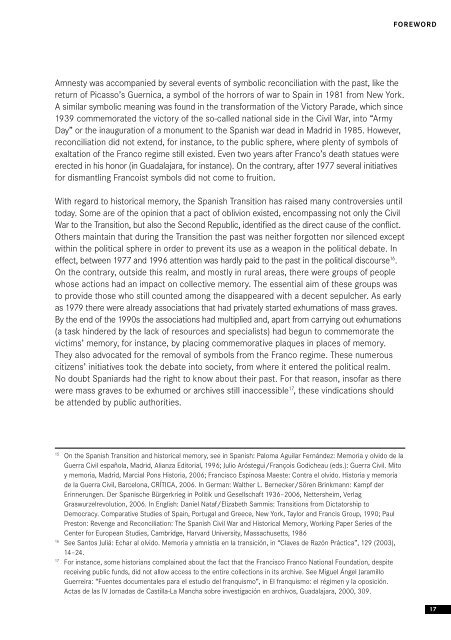Vademecum
Vademecum
Vademecum
Create successful ePaper yourself
Turn your PDF publications into a flip-book with our unique Google optimized e-Paper software.
Amnesty was accompanied by several events of symbolic reconciliation with the past, like the<br />
return of Picasso’s Guernica, a symbol of the horrors of war to Spain in 1981 from new york.<br />
A similar symbolic meaning was found in the transformation of the Victory Parade, which since<br />
1939 commemorated the victory of the so-called national side in the Civil War, into “Army<br />
Day” or the inauguration of a monument to the Spanish war dead in madrid in 1985. However,<br />
reconciliation did not extend, for instance, to the public sphere, where plenty of symbols of<br />
exaltation of the Franco regime still existed. Even two years after Franco’s death statues were<br />
erected in his honor (in Guadalajara, for instance). on the contrary, after 1977 several initiatives<br />
for dismantling Francoist symbols did not come to fruition.<br />
With regard to historical memory, the Spanish transition has raised many controversies until<br />
today. Some are of the opinion that a pact of oblivion existed, encompassing not only the Civil<br />
War to the transition, but also the Second republic, identified as the direct cause of the conflict.<br />
others maintain that during the transition the past was neither forgotten nor silenced except<br />
within the political sphere in order to prevent its use as a weapon in the political debate. in<br />
effect, between 1977 and 1996 attention was hardly paid to the past in the political discourse 16 .<br />
on the contrary, outside this realm, and mostly in rural areas, there were groups of people<br />
whose actions had an impact on collective memory. the essential aim of these groups was<br />
to provide those who still counted among the disappeared with a decent sepulcher. As early<br />
as 1979 there were already associations that had privately started exhumations of mass graves.<br />
By the end of the 1990s the associations had multiplied and, apart from carrying out exhumations<br />
(a task hindered by the lack of resources and specialists) had begun to commemorate the<br />
victims’ memory, for instance, by placing commemorative plaques in places of memory.<br />
they also advocated for the removal of symbols from the Franco regime. these numerous<br />
citizens’ initiatives took the debate into society, from where it entered the political realm.<br />
no doubt Spaniards had the right to know about their past. For that reason, insofar as there<br />
were mass graves to be exhumed or archives still inaccessible 17 , these vindications should<br />
be attended by public authorities.<br />
15 on the Spanish transition and historical memory, see in Spanish: Paloma Aguilar Fernández: memoria y olvido de la<br />
Guerra Civil española, madrid, Alianza Editorial, 1996; Julio Aróstegui/François Godicheau (eds.): Guerra Civil. mito<br />
y memoria, madrid, marcial Pons Historia, 2006; Francisco Espinosa maeste: Contra el olvido. Historia y memoria<br />
de la Guerra Civil, Barcelona, CrÍtiCA, 2006. in German: Walther l. Bernecker/Sören Brinkmann: Kampf der<br />
Erinnerungen. Der Spanische Bürgerkrieg in Politik und Gesellschaft 1936–2006, nettersheim, Verlag<br />
Graswurzelrevolution, 2006. in English: Daniel nataf/Elizabeth Sammis: transitions from Dictatorship to<br />
Democracy. Comparative Studies of Spain, Portugal and Greece, new york, taylor and Francis Group, 1990; Paul<br />
Preston: revenge and reconciliation: the Spanish Civil War and Historical memory, Working Paper Series of the<br />
Center for European Studies, Cambridge, Harvard university, massachusetts, 1986<br />
16 See Santos Juliá: Echar al olvido. memoria y amnistía en la transición, in “Claves de razón Práctica”, 129 (2003),<br />
14–24.<br />
17 For instance, some historians complained about the fact that the Francisco Franco national Foundation, despite<br />
receiving public funds, did not allow access to the entire collections in its archive. See miguel Ángel Jaramillo<br />
Guerreira: “Fuentes documentales para el estudio del franquismo”, in El franquismo: el régimen y la oposición.<br />
Actas de las iV Jornadas de Castilla-la mancha sobre investigación en archivos, Guadalajara, 2000, 309.<br />
FoRewoRd<br />
17


